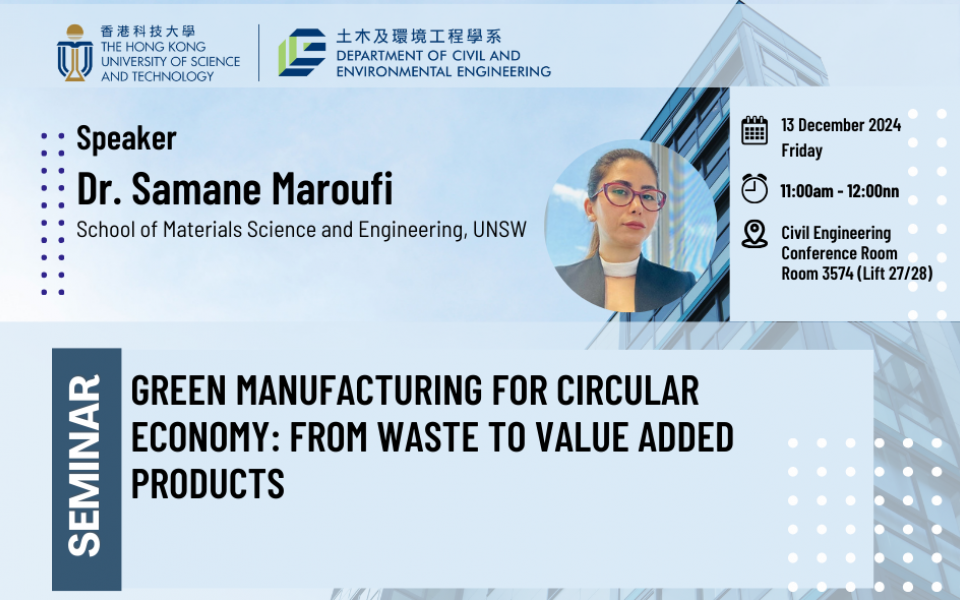Civil Engineering Departmental Seminar - Green Manufacturing for Circular Economy: from Waste to Value Added Products
Supporting the below United Nations Sustainable Development Goals:支持以下聯合國可持續發展目標:支持以下联合国可持续发展目标:
Green Manufacturing for Circular Economy: from Waste to Value Added Products
Sustainable, emission-free, and eco-friendly methods for fabricating high-quality materials have garnered significant attention in recent years as industries move away from traditional linear synthesis processes reliant on finite virgin resources. Increasingly, a circular model is being adopted, where end-of-life products are strategically recycled and reused as feedstock, contributing to the reduction of waste and the efficient use of resources.
This presentation highlights two innovative technologies that align with sustainability and circular economy principles in critical industries: rare earth element (REE) recovery and steel production. The first part of the talk explores a three-stage process for the selective purification of rare earth oxides (REOs) from end-of-life nickel-metal hydride (Ni-MH) batteries. This process enables the high-yield fabrication of defect-rich Mn1-x-y(CexLay)O2-δ ultra-thin films, which are tunable in thickness and exhibit exceptional optoelectronic properties. These films demonstrate remarkable capacitance retention and energy density, positioning them as promising candidates for advanced energy storage devices. By recycling rare earth elements and integrating them into energy storage systems, this approach embodies a fundamental principle of the circular economy—extending material life cycles and reducing reliance on finite virgin resources.
The second part of the presentation addresses the steel industry, one of the largest energy consumers and carbon emitters in manufacturing. Traditionally reliant on coke, the industry is shifting toward more sustainable practices through the adoption of Polymer Injection Technology (PIT), developed at the SMaRT Centre at UNSW. PIT, which has been implemented by Electric Arc Furnace (EAF) steelmakers across Australia, Asia, and Europe, has led to substantial reductions in energy consumption, enhanced furnace efficiency, and decreased coke usage. Additionally, PIT helps divert millions of waste tyres from landfills, transforming waste into valuable feedstock for steel production. These technological advancements demonstrate the potential of circular economy solutions to reduce environmental impacts and enhance resource efficiency in heavy industries.
Dr. Samane Maroufi is a Senior Lecturer at the School of Materials Science and Engineering, UNSW, where she teaches and conducts research. Her expertise spans high temperature pyrometallurgical processing, sustainable materials processes (including waste recycling and materials transformation), and the synthesis of nanostructured materials from waste for various applications. As an expert in developing innovative green solutions for waste challenges, she has substantial experience collaborating with industries, leading industrial projects, securing grant funding, and integrating research into the manufacturing sector.
Since 2018, Dr. Maroufi has made significant contributions to education by fully designing, developing, and delivering courses related to waste recycling and sustainability. Her reflective approach to teaching pedagogy earned her recognition as a Fellow of the Higher Education Academy (FHEA), awarded by Advance HE in 2021. In 2022, she received the UNSW Vice-Chancellor’s Award for Outstanding Contributions to Student Learning (Early Career).
